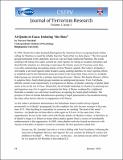Abstract
In 1996, Osama bin Laden declared jihad against the American forces occupying Saudi Arabia, calling for Muslims to expel the infidels from the “land of the two holy places.” The first sacred ground mentioned in this statement, however, was not Saudi Arabia but Palestine. His words seething with hatred, bin Laden scorned the Arab regimes for failing to recapture Jerusalem and described the situation as a festering wound upon the Islamic umma.[1] Fourteen years later, even after orchestrating devastating attacks in three Western capitals, Bin Laden’s al-Qaeda is still unable to do much against Israel besides issuing scathing diatribes. Its most vigorous efforts to establish itself in the Palestinian arena have been in the Gaza Strip. Here, however, al-Qaeda-linked groups are stymied by a perhaps surprising adversary: Hamas. But despite Hamas’s efforts to suppress them, Salafi-jihadi groups maintain an underground presence. Even if al-Qaeda affiliates remain weak operationally in comparison to Hamas, al-Qaeda’s ideology of global jihad seems to be on the rise in Gaza. Meanwhile, the al-Qaeda leadership is relentless in pursuing new and ingenious ways for its agents to penetrate the Strip. A Hamas weakened by a tightened blockade or another war with Israel would leave an opening for Salafi-jihadi militants. The prospect of these al-Qaeda-linked factions upsetting a fragile peace needs to be considered among the many other factors relevant to engagement with Hamas.
Citation
Marshall, W. (2010). Al-Qaeda in Gaza: isolating “the base”. Journal of Terrorism Research, 1(1), pp. 54-69.
Publication
Journal of Terrorism Research
Rights
This is an open access article published in Journal of Terrorism Research. This work is licensed under a Creative Commons Attribution 3.0 License (http://creativecommons.org/licenses/by/3.0/)
http://creativecommons.org/licenses/by/3.0/


